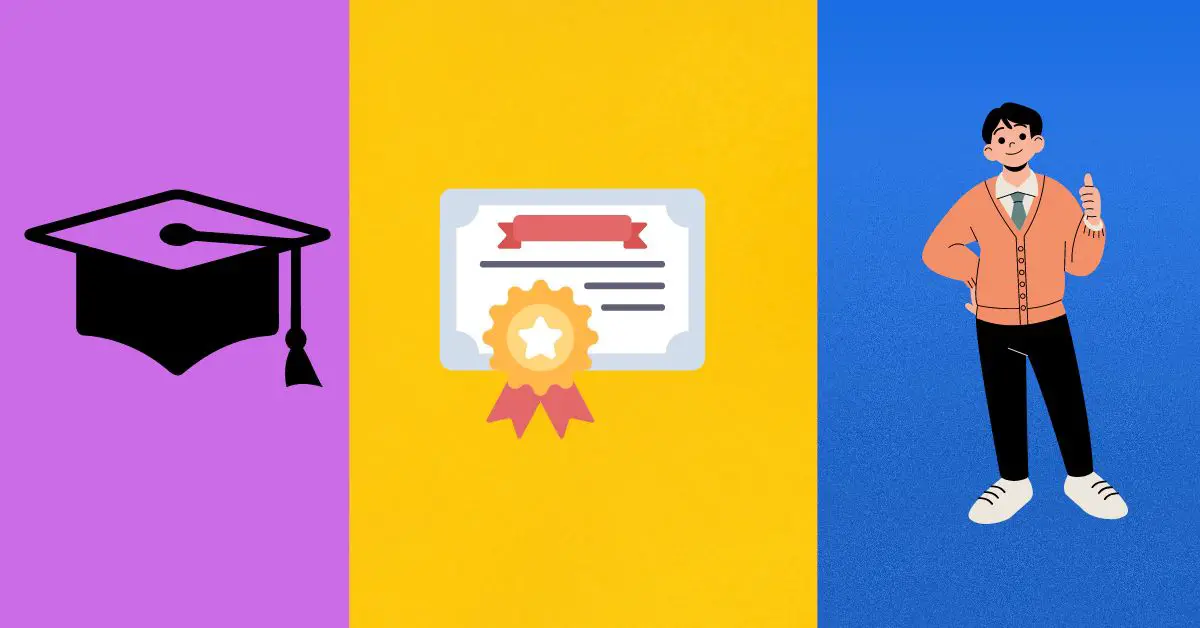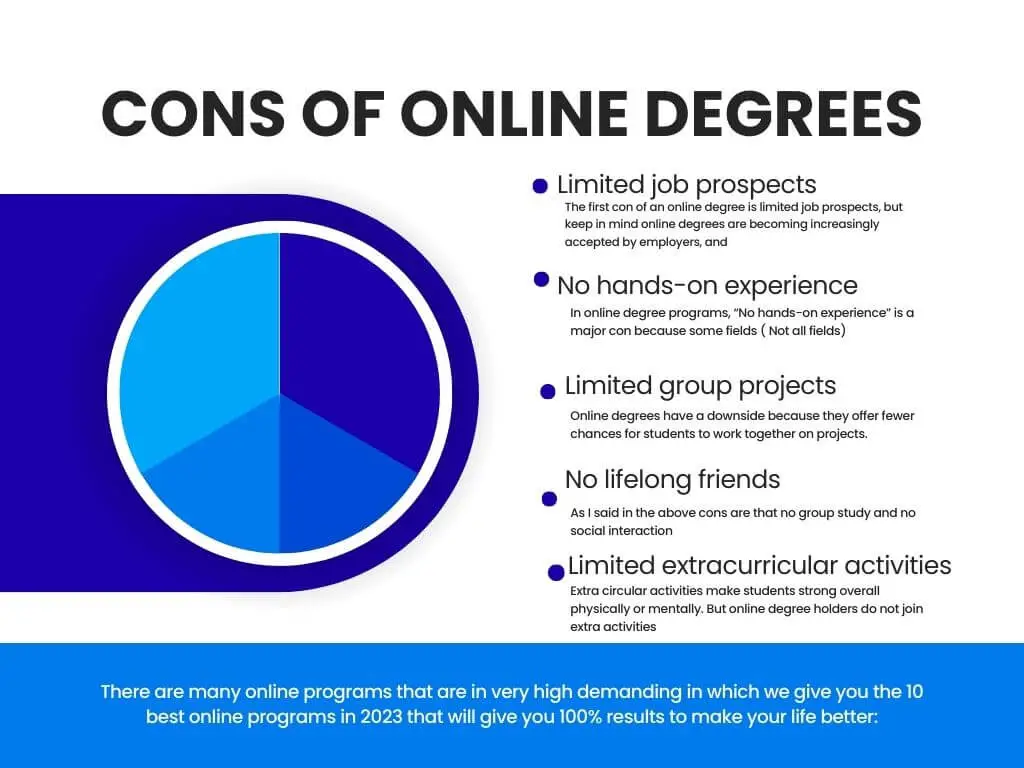10 Pros And Cons Of Online Degrees For Students in 2024
Last Updated on January 17, 2024
In this modern time, online education is very popular, and students like this type of education to gain knowledge and get a degree. But in online education, many colleges, and universities give degree that is called online degrees for those online students who complete their academic level and pass the exam. So, Now we discuss in detail the pros and cons of online degrees for students.

Before Applying to any online university you should read these pros and cons that will make your decision better and provide a good future with the basis of an online degree.

So, lets get started on this important topic but keep in mind to carefully read this entire article.
5 Pros of Online Degrees:

1. Improved Access to Education
Education is the major key to get success in life. Many students never go to traditional classes because of many causes. This is because they don’t have time to go to a traditional classroom to seek knowledge and get a university or college degree. The major pros of online learning are that they learn anywhere, everywhere with the help of virtual learning to get an education on any online programs and get a degree online.
Learning new things easily is very easy nowadays with a one-finger click in your home through the internet or device. Thats why we give this heading in the first pros because this time, traditional education is very difficult.
2. Flexibility (Online Degrees)
Flexibility means students can create their timetable and learn according to their time. In traditional college, the student is not self-willed to make their plan or they cannot work anywhere.
If you work full time in your work then you can take online classes in the evening or on a weekend.
High school students or elementary students, easily manage their time in online learning platforms to access course materials and lectures anytime. This flexibility allows students and parents as well who want to learn skills or knowledge.
3. Affordability
Online courses are much cheaper than physical classes because online programs have lower tuition fees and fewer associated costs, such as commuting, housing, and meals, compared to traditional on-campus programs. This makes online degrees a more affordable option for many students, especially those who may have financial constraints.
Another benefit of online is that students travel long distances to attend traditional classes, incurring significant transportation costs. By enrolling in an online degree program, they can avoid these costs and save money.
That’s why we say that online degrees can make higher education more accessible and attainable for a wider range of students.
4. Comfortable learning environment
A comfortable learning environment is very crucial to boost students learning experience. With these pros, students always stay focused because of online environment, students can study from the comfort of their own homes or any other location that they prefer.
In high school, or in many colleges, many irritating students (which means bad students ) produce noise that causes a distracting environment. So, virtual learning is very good for students who want to learn in the comfort place.
5. Wide Range of Programs
For online learner, there is much wide range of programs offered by online schools or online colleges that give you online degrees. with an online degree program, that is not limited by geographical location, students choose and admission to those programs according to their interests and passions to gain knowledge and skills because many online degree programs offer specialized or niche areas of study that may not be available at local universities or colleges.
There are many online programs that are in very high demanding in which we give you the 10 best online programs in 2024 that will give you 100% results to make your life better:
| Program | Description |
| Online Teaching Certification | Prepares individuals to become online educators |
| Educational Leadership | Trains individuals for leadership roles in education |
| Curriculum and Instruction | Focuses on designing and implementing educational programs |
| Early Childhood Education | Focuses on teaching children from birth to age 8 |
| Special Education | Prepares individuals to teach students with disabilities |
| Instructional Design and Technology | Focuses on creating effective educational materials and technology |
| Educational Psychology | Focuses on the psychological aspects of learning and education |
| Educational Administration | Trains individuals for administrative roles in education |
| Adult Education | Focuses on teaching adults in various settings |
| Higher Education Administration | Prepares individuals for leadership roles in higher education |
These programs are highly in demand in the education niche, as they provide specialized training and expertise in various areas of education.
5 Cons of Online Degrees

6. Limited job prospects in Online degrees
The first con of an online degree is limited job prospects, but keep in mind online degrees are becoming increasingly accepted by employers, and some employers may view online degrees as less valuable than traditional degrees, which could impact job opportunities for graduates.
However, as more reputable universities offer online programs and online learning becomes more common, this perception is changing. Graduates of online programs can improve their job prospects by gaining relevant experience and networking.
7.No hands-on experience
In online degree programs, “No hands-on experience” is a major con because some fields ( Not all fields), like healthcare or engineering, require hands-on training that is difficult to get online.
Nursing students need to practice administering injections or conducting physical assessments on real patients. Without hands on experience, students may have big gaps in their training, cognitive disabilities, and learning experience, but some online programs offer virtual experiences, and they may not fully replicate real-life scenarios. Therefore, students who want online education must enroll in an institution that gives hands-on experience.
8. Limited group projects
Online degrees have a downside because they offer fewer chances for students to work together on projects. In traditional classrooms, group projects help students learn communication, teamwork, and leadership skills. But in online degree programs, group projects may be less frequent due to challenges in coordinating schedules and communication among remote learners.
In a traditional class, students can work together in person to complete group assignments. But in an online degree program, students may have to communicate through email or video conferencing.
So, without a group many online students face difficulties that will impact the quality of the project.
9. No lifelong friends
As I said in the above cons are that no group study and no social interaction and no lifetime friends for online student. Friends are the need by many students and in traditional education, students attending a physical campus that have many chances to socialize and form close connections with their peers.
However, in online learning, virtual interactions like online discussion forums or chat rooms exist, they may not be as effective at long-term friendships as in-person interactions. Thats why this lack of social interaction can be a significant disadvantage for some students.
10. Limited extracurricular activities
Extra circular activities make students strong overall physically or mentally. But online degree holders do not join extra activities. These activities, such as clubs, sports teams, and volunteer work, help students build friendships and explore their interests beyond the classroom. Therefore, before selecting an online degree program, students should carefully read this article and then see the programs ( pros and cons ) then apply.
Conclusion
In conclusion, we can say that an online degree offers many advantages. But, they also come with some disadvantages. If we advise you, we suggest you learn online and get your degree, but if you want to become a doctor or engineer, we don’t recommend you to get knowledge through online. You should read the pros table in the above article and apply to the programs that we have selected for you which will give you 100% results in the future.
What are your thoughts on online degrees? Have you pursued an online degree yourself or are you considering it?
Let us know in the comments!
Frequently Asked Questions (FAQs)
Q1: Are online degrees cheaper than traditional degrees?
Online degrees are more affordable than traditional degrees, as they save students money on commuting and housing costs like:
- No commuting costs
- Lower tuition fees
- No need for textbooks
- Fewer miscellaneous expenses
- Ability to work while studying
Q2: Can I earn a degree entirely online?
Yes, many universities and colleges offer fully online degree programs. These programs provide students with the same quality education and degrees as traditional on-campus coursework. However, it is important to carefully research and choose an accredited online program that meets your academic and career goals.
Q3: Will employers value an online degree?
While there may still be some stigma attached to online degrees, they are becoming more widely accepted by employers.
Q4: Can I get hands-on experience with an online degree?
Yes, but in some programs, we tell the above you should enroll in those programs that provide you experience in physical classes, and if you want doctor degree or engineering degree you should go to traditional classes. but students studying fields that require hands-on experience may need to supplement their online education with in-person training.
Q5: Is it easy to stay motivated with an online degree?
Yes, if you join the right online program, you should stay motivated with an online degree. But some students feel motivated in traditional classes because a traditional education degree is always acceptable for jobs. However, self paced learning can also allow students to work at their own speed and take the time they need to understand difficult concepts.
Q6: How can online colleges benefit students who cannot attend traditional schools?
Online college gives online class for those students who are not attending traditional college or traditional school. As you read in the above content online platforms provide you with many benefits like Improved Access to Education, Flexibility, Affordability, a Comfortable learning environment, and a Wide Range of Programs as well.
Q7: What factors should students consider when choosing an online course?
First of all, see if the program has a scope or not and whether it provides you with skills or not. Before enrolling in an online program, you should first see the program scope, then see the program cost, and third, get experience because enrolling in that university will give you knowledge, skills, and hands-on experience.
Q8: What are the most popular online programs for online learners?
In 2024, we give you in the above table that is most demanding this year, you should enroll in that program according to your interest.
Q9: How has distance learning evolved over the years?
Distance learning has evolved significantly over the years, from correspondence courses to the use of modern technology. The introduction of the internet and online platforms has made it more accessible and convenient for students. Today, distance learning provides various learning style that is become a popular and widely accepted alternative to traditional on-campus education.
Q10: How can professors interact with students in an online learning environment?
Professors can teach and interact with students in an online learning environment through various methods provided by online platforms, such as
- Discussion forums
- Chatrooms
- and Video conferencing.
They can provide feedback on assignments and assessments through the learning management system or through email.
Q11: How do online classes facilitate class discussion?
The best thing about online classes is that they facilitate class discussions through various tools. These platforms allow students to participate
- Group discussions
- Ask questions
- and Share ideas with their teachers.
Q12: How are assignments handled in online classes?
In online classes, assignments are submitted through an online platform such as a learning management system. The instructions for assignments are usually published online, and students may be required to complete and submit them by a certain deadline. In some cases, assignments may be graded automatically by the Ai system, while others may be reviewed and graded by the instructor. Additionally, online classes may also incorporate collaborative assignments that require students to work together virtually through discussion forums or other online tools.







